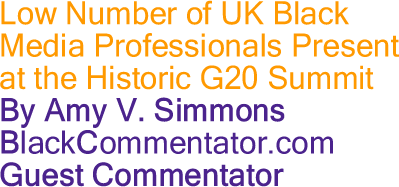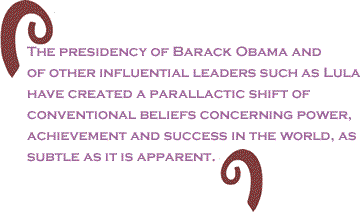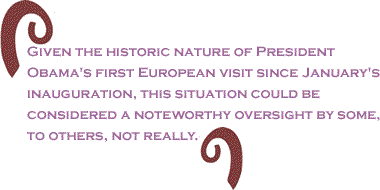
|
|||||||||||||||||||||||

|
|

Custom Search
|
|
 |
|
| When the G20 Summit convened this week in London, there was a dearth of coverage by UK media professionals of color, in particular Black journalists. This was most apparent when considering mainstream coverage, but in many cases it was also evident in the Black or ethnic media. Lack of media platforms, numbers, resources and the general state of the news business have all contributed to this condition. Given the historic nature of President Obama's first European visit since January's inauguration, this situation could be considered a noteworthy oversight by some, to others, not really. When I asked some journalists in the UK about all of this both prior to the London Summit and immediately after, the responses were varied, yet in many ways simpatico. Deborah Gabriel, founder and director of People With Voices, a new media organization based in London, England, was not scheduled to cover the event. "I have not received any official notification/press invite to the event from any government sources, although I am press registered on the News Distribution Network which manages all government communications and have had previous contact/invites to press briefings." she stated. "Personally I would have loved to cover the event, especially since I am about to launch a journalism training and news publishing company as a social enterprise to try to bridge the gap between the mainstream and ethnic media to encourage and support more in individuals from visible minorities into journalism." UK journalist Angela Foster, of the Guardian, tried to arrange an interview with Michelle Obama, but was refused. "I did try to get an interview with her, as I did last time she was over here, but was told the First Lady wasn't going to be doing any interviews", she stated. Yet, as a Black journalist and citizen of the UK, the visit of the first African American President of the United States was a special event. "Obviously, as a black journalist it is very exciting to have a black president, particularly seeing him in Downing Street, meeting the Queen, etc." she reflected. Ms. Gabriel took it a step further. "I would go as far as saying that I have been partly inspired by President Obama to create this business (People With Voices) as a means of promoting unity across people from different ethnic and religious backgrounds - so it is ironic that as a journalist that I won't be at the event." However, she issued a caveat when considering fair and balanced coverage of this historic figure. "My view is that whilst on a personal level it is wonderful to have a black president of the US, on a professional level he must be held accountable like any other politician and held up to scrutiny."
The view of Lester Holloway, independent journalist and most recently, editor of the New Nation, Britain's top African and Caribbean weekly newspaper, was somewhat similar. "He's (President Obama) coming not as an icon or personality, but to do a job representing the interests of the United States at the G20 summit, so this is not a time for celebratory rallies, it's a time for results." he stated emphatically. Holloway was very tuned into the overall historic nature of the election of Barack Obama last November, his subsequent role as a world leader, and the precedent set. "The election of President Obama is obviously hugely significant symbolically, for the inspiration it gives to African people in Britain and worldwide, and for the 'agenda' it sets regarding the urgency of removing barriers to equality and justice." he said. Although all were in agreement that it was important for the black or ethnic press to be involved, he was quick to add that there is a different task for them to perform when providing coverage of President Obama. "I don't think its' the role of the black media to try and compete with the national mainstream. We don't need to join the scrum to report 'he did this, he said that'. The mainstream keep laboring on the fact that Obama is black, but daren't take that any further for fear of what it means to their own privileged position." he pointed out. He further added: "The black media, by contrast, need to have a conversation about what Obama means, and what we need to do in terms of organising, in terms of reaching for the stars, in terms of educating ourselves about the history we weren't taught and the links to today's power structures." Richard Prince, media expert and editor of Richard Prince's Journal-ISMs, a diversity report issued from the prestigious Maynard Institute in Oakland, CA was frank when asked about African American journalists and black media covering the event. "It is important to remember that unless they are freelancing or going as a columnist or commentator, those who will be covering the event will be reflecting the priorities of their news organizations. For mainstream news organizations, for the most part those priorities will not involve race. And I doubt that most black-oriented news outlets in the States can afford the trip." He too saw this as a missed opportunity for the unique perspective black reporters could bring to the overall. "There are racial overtones to this meeting, witness Lula's remark about "blue-eyed greed," and there is a clear division along north-south lines about proposed solutions to the global economic crisis." Prince said. "It is the job of any good reporter to reflect all that, and I would hope that black journalists, as good reporters, will do so. It's part of providing the complete picture, and one reason for having a diverse reporting and editing team. " The presidency of Barack Obama and of other influential leaders such as Lula have created a parallactic shift of conventional beliefs concerning power, achievement and success in the world, as subtle as it is apparent. This fact is not lost on UK journalist Angela Foster, of the Guardian. "I believe black reporters should be involved more in covering the President and/or First Lady", she reflected. "There are some things, particularly when covering Michelle Obama, that we may be able to report differently; and with the President nuances that the mainstream press might miss." One such occasion could be found on Thursday during the First Lady's surprise visit to Elizabeth Garrett Anderson School in Islington, North London, which has a largely Black student body. Mrs. Obama's carefully chosen language during her personal and moving speech was telling.
She reflected with pride upon the First Lady's class, intelligence, and importance as a role model, not only for those girls at the school, but for Black women in London and around the world. She also found it particularly refreshing to see an intelligent, successful Black woman being held up as a role model rather than the usual entertainment or sports figures. Still, Angela Foster, who is also frank when tackling this subject matter on its own terms, is nonetheless concerned about a possible backlash down the road when it comes to covering President Obama in general. "I do not feel any pressure not to refer to his race or the precedent that has been set, but that may just be the paper I work for. It's impossible to ignore it. But I do worry that everyone will turn on him one day and all the favorable press will end." BlackCommentator.com Guest Commentator, Amy V. Simmons is a freelance writer and a member of the National Association of Black Journalists, the Philadelphia Association of Black Journalists and the Native American Journalists Association. Click here to contact Ms. Simmons. |
|
Any BlackCommentator.com article may be re-printed so long as it is re-printed in its entirety and full credit given to the author and www.BlackCommentator.com. If the re-print is on the Internet we additionally request a link back to the original piece on our Website. Your comments are always welcome. eMail re-print notice
If you send us an eMail message we may publish all or part of it, unless you tell us it is not for publication. You may also request that we withhold your name. Thank you very much for your readership. |
|
| |
|
| April
9 , 2009 Issue 319 |
|
| Executive Editor: Bill Fletcher, Jr. |
| Managing Editor: Nancy Littlefield |
| Publisher: Peter Gamble |
| Est. April 5, 2002 |
Printer Friendly Version
in resizeable plain
text format or pdf
format. |
| Frequently Asked Questions |

|
 |
| |
| |































